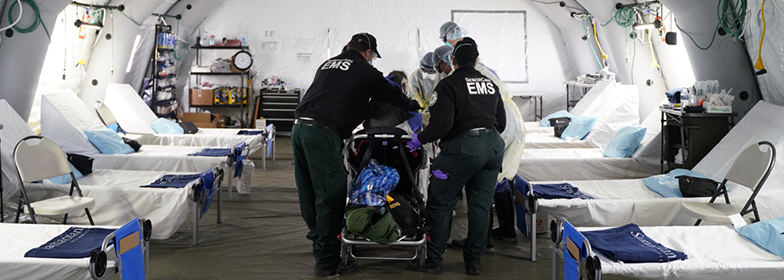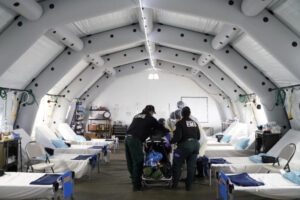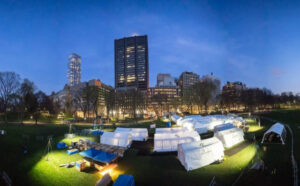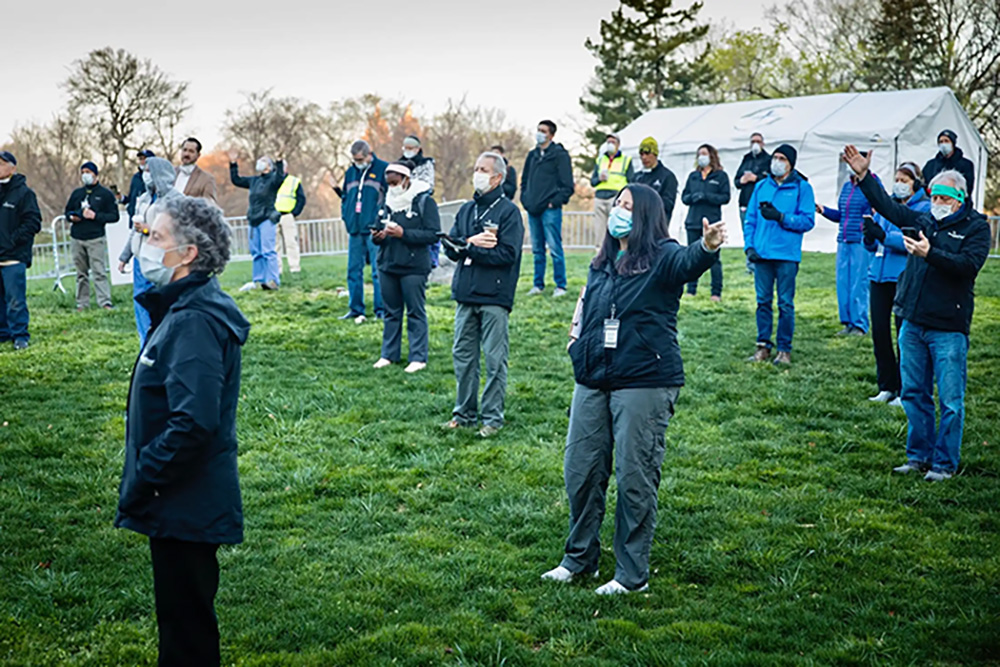Two Husky medical professionals served this spring at what became a ground zero for treating
COVID-19-positive patients. Samaritan’s Purse, a humanitarian organization led by Franklin Graham, stepped in to the meet the needs of those who became overflow patients for the Mount Sinai Health System of New York City.
On April 1, the organization opened a 14-tent, 68-bed respiratory care unit in Central Park. The emergency field hospital treated COVID-19 patients for more than a month, relying on helpers from throughout the nation and the world.
Carrie Hogue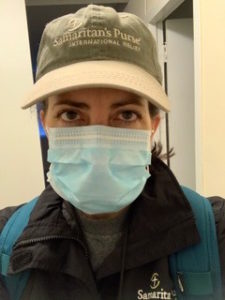
Carrie Hogue ’96 realized the call to disaster relief mission work when she confided in a friend several years ago that she wanted to travel to an affected country and help following a devastating tsunami. The friend pointed out that Hogue had often desired to help in such situations. Later, her father suggested she look into Samaritan’s Purse. Unfamiliar with the organization’s relief work, Hogue researched the opportunity, completed the application process for the Samaritan’s Purse DART (Disaster Assistance Response Team) and was accepted.
Hogue has always been up for a challenge. During her time at HBU, Hogue majored in Biology and Human Kinetics and played volleyball and softball. The rigorous coursework and demands of two sports provided ideal preparation for physical therapy school at the University of Texas Medical Branch. The mother of two daughters began a fulfilling career as a physical therapist and returned to her hometown of Paris, Texas.
With responsibilities at her outpatient clinic and at home, Hogue still knew God was calling her to serve. Her first deployment with the DART team was in September 2019 to the Bahamas after Hurricane Dorian wreaked havoc in the area. “I was on an assessment team. We went all over the smaller islands trying to assess the needs to better know what programs and things to develop,” she said. “I came back for five days and they asked me, ‘Would you like to be an information officer for three weeks?’ The devastation was horrific; I was still trying to process that. I went back and served for three more weeks as the information officer. I was there for a total of five weeks.”
Then, when she was called and asked to serve in NYC this spring, Hogue paused to ask what God’s will would be. “I’ve learned to never tell Him ‘no,’ but there were a few obstacles,” Hogue remembered. Those included having to take off work for more than a month in order to work at the field hospital and quarantine for two weeks upon returning. There was a list of four major items that had to be taken care of in order for the trip to viable, she said.
“I usually ask God to make things ‘Carrie clear.’ I think, ‘God, it may be clear to you, but make it clear to me.’ Within 20 minutes of making phone calls, all four items were taken care of. She said, “The Lord swung the doors wide open. I sat on my couch and realized I would rather be doing exactly what the Lord wants me to do somewhere else than out of His will in my hometown. All the things He had to orchestrate to get me there – it blows my socks off.”
Hogue packed and made the trip, arriving in New York City on March 30. She served as a medical information officer, collecting data and statistics on patients and serving as the patient/family liaison.
Every day, Hogue donned head-to-toe protective gear and worked 12 to 14-hour days. The tent hospital was sophisticated and well-run with an ICU tent, X-ray tent, lab tent, supply tent, and more. “It is a fully functioning hospital with heat and air conditioning, food and clothing,” she explained.
COVID-19 positive patients came via Mount Sinai from throughout the area. Doctors and nurses worked tirelessly. “I would hear our ICU team say, ‘We go home and cry every day, hope we sleep and come back again.’ We grieved hard when we lost patients, or at the disease and the effects on the patients, because sometimes nothing was working,” she said.
During hard days, relationships with other workers were enriching. There were people from throughout the US and the world whom Hogue had worked with in the Bahamas. The group would pray together during group devotionals at the twice-per-day shift changes, reminding each of them of their greater purpose.
While the Big Apple is normally bustling, the unusual stillness provided ease for the visitors. “There were very few – if any – cars. It would take me three minutes to walk to work. There were dorms in the Mount Sinai Hospital System across the street and the Renaissance Hotel also put us up for free,” Hogue said. “I could stand in the middle of Times Square and take a picture with no vehicles. On a regular day, it would take an hour to drive from Times Square to Central Park, but it took us eight to 10 minutes.”
New Yorkers showed their support for the team, bringing meals and practical supplies like tall socks to be worn with workers’ rubber boots. “At 7 p.m. every day, the people in the city would clap, scream, honk their horns, and shake bells for people at shift change,” Hogue said. “The people of New York just poured it out.”
After one half-day off in five weeks, Hogue returned home to process the time and rest during quarantine. Hogue’s Paris community surprised her with a drive-by parade featuring firetrucks, a state trooper, friends and family. “I sat in my driveway and people were honking horns and dropping off envelopes and food. And my church made a welcome-home video,” she said. “I’m not typically super emotional but I was crying and saying, ‘How did you guys do this?’ The love and support I’ve been shown has been amazing.”
Hogue doesn’t like praise for what she did, and says, “I’m wired with this sense of adventure. Never underestimate what the Lord can do in your life. It doesn’t have to look like New York City or disaster relief. In my mind, I haven’t done anything grand, but was obedient to the Lord. I’m humbled that the Lord would allow me to be part of it.”
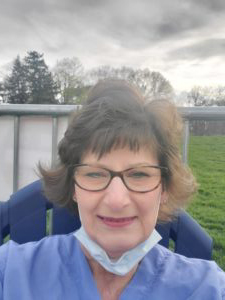 Terri Kimble
Terri Kimble
A student in the HBU Family Nurse Practitioner (FNP) program and scheduled to graduate in December 2020, Terri Kimble didn’t seem to have the time to serve in Samaritan’s Purse New York City field hospital, but HBU program leaders assured her that they would work with her and allow her to pursue the opportunity.
Kimble initially earned a degree in elementary education and never thought she would become a nurse. However, in 1995, Kimble had the opportunity to volunteer on an ambulance. She loved the work so much, she became a paramedic two years later. “The more I took care of my patients, I learned that I really was a nurse at heart. I became an LVN in 1998 and a registered nurse (RN) in 2005. I earned my Bachelor of Science in Nursing (BSN) in 2013 from UT Arlington.”
While continuing to work part-time in emergency management services, Kimble worked as a nurse in medical/surgical units, school nursing, family practice, and the emergency room setting. For 24 years, she has worked at HCA Houston Healthcare Tomball; most of the time has been working in the ER. She also serves as an adjunct LVN instructor for Montgomery College.
Even with her busy schedule, Kimble was strongly drawn to the Samaritan’s Purse Disaster Assistance Response Team (DART) when she learned about it at a missions conference two years ago.
“As I saw the desperate physical, as well as spiritual needs, I told the Lord, ‘If you open this door, I will run through it!’ I was accepted into Samaritan’s Purse last year, went to training in September 2019, and received my first opportunity for deployment in April 2020,” she said. “As I prayed about going, I thought, ‘Now what would Jesus do in this situation?’ I believe He would go where He was needed most. It was easy to say ‘yes’ to go to New York.”
Kimble describes Samaritan’s Purse as Christ-centered and supportive of those serving. She accepted the call for service and worked from April 15 through May 6 in the Central Park field hospital. Even as a veteran medical professional, the safety procedures were especially rigorous for Kimble.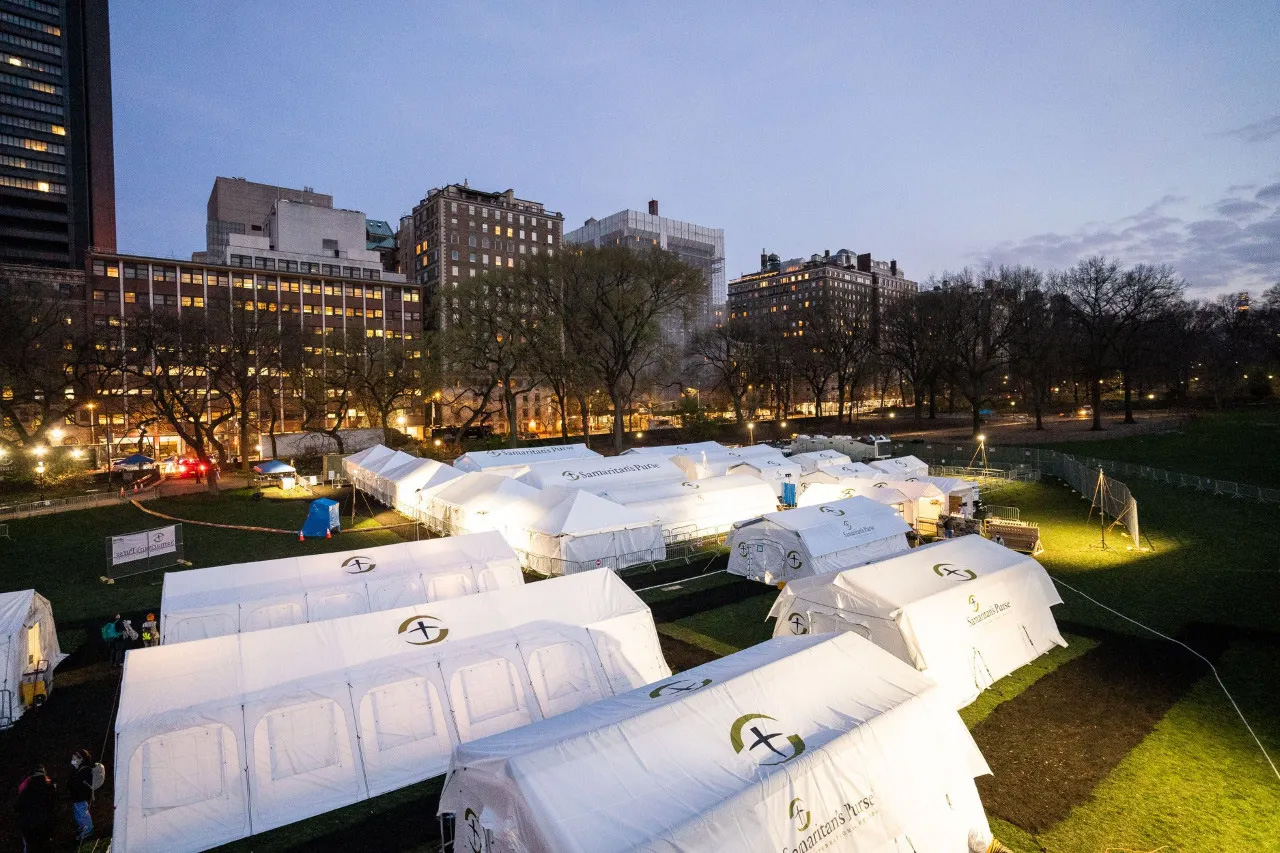
“Samaritan’s Purse has experts regarding the management of infectious diseases who have had a lot of experience dealing with different disease outbreaks. I trusted their protocols and never felt unsafe,” she said. “It was a challenge to work in the personal protective equipment (PPE) gear. We wore boots, a body suit, double gloves, N95 masks, a hairnet and face mask. There was strict adherence required to maintain aseptic techniques. In order to be safe, we were unable to eat or drink for the time we were in the ‘hot zone’ where the patients were. We were given adequate breaks, but it was quite a challenge to ‘don and doff’ our gear. This, however, was gladly done, especially when I saw my patients dealing with this awful disease. When I would get thirsty and hot in my suit, I just thought of how much my patients were suffering and my discomfort seemed very small. I’m an ER nurse, so I am used to saving lives. It was very difficult when we would lose a patient to this deadly monster of a disease in spite of our best efforts. I knew they were getting state-of-the-art medical care, but unfortunately, we saw many die. Many of them I got to know very well and fell in love with them quickly. They were always so appreciative with everything and told me ‘thank you’ over and over. I would speak with their family and let them know of their progress. Sometimes the news was bad. These people were so sick. Some had high fevers, relentless coughing and were short of breath. We tried to make them as comfortable as possible with not only our medical interventions, but with back and foot rubs. One lady was struggling keeping her C-PAP on. It can be very difficult for some because it is not natural to have oxygen forced into one’s lungs. She kept raising up in bed, her eyes wide, and I could see she was scared. I stayed by her, holding her hand and stroking her arm while putting my cell phone playing Christian music to her ear. After about 30 minutes, she fell asleep. It was times like these that I felt I was really making a difference and it felt good. When a patient was discharged home, we would have a parade of staff walk them out while clapping and ringing bells. It truly was a victory celebration. I loved to see their faces as they would look back at all of us cheering them on. Each patient I saw left in tears while thanking us. I cried with each departure, thanking God for being able to be a part in their healing, not only physically, but in many cases, emotionally and spiritually as well.”
Following her experience, Kimble is grateful for the many positives. “Though physically demanding, God was my strength and He showed His hand in so many different situations,” she said. “It was such a joy to see how God used the team. I witnessed godly doctors and nurses praying with patients and their families at their request, sometimes via iPad or phone. I saw them holding their hands, stroking their heads and spending a lot of quality time just talking with them or sitting beside them. Every patient felt loved and cared for. I heard several patients call us angels from heaven. Many of them came to a personal relationship with Christ. I am so humbled by this experience. I was able to show the love of God by being the hands and feet of Jesus to these precious people. I’m thankful my professors worked with me regarding my assignments. Everyone was impressed with how I was supported by my Christian university. It feels so good to be able to express my faith and live out my convictions while aligning with HBU’s values and mission. I’ve never been more proud to be a student here!”

